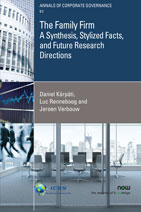The Family Firm: A Synthesis, Stylized Facts, and Future Research Directions
By Daniel Kárpáti, Department of Business Economics, Erasmus School of Economics, Erasmus University Rotterdam, The Netherlands, karpati@ese.eur.nl | Luc Renneboog, Department of Finance, Tilburg University, The Netherlands, luc.renneboog@uvt.nl | Jeroen Verbouw, Department of Finance, Tilburg University, The Netherlands, and Department of Accounting, Corporate Finance, and Taxation, Ghent University, Belgium, H.W.Verbouw@tilburguniversity.edu
Abstract
In acknowledging and exploiting the substantial heterogeneity among family firms, scholars are increasingly stepping away from the dichotomization of family influence to better understand critical nuances that explain how, why, and when family firms differ from their nonfamily counterparts. By means of a sample of privately-held family firms, this study advances the literature by showing that various sources of heterogeneity are correlated. We take a family-level perspective and show how heterogeneous family values interact with more traditional factors that have received ample scholarly attention such as succession, firm strategies, ownership and governance, and financial policies. Specifically, we present an extensive synthesis of the recent and topical literature on each topic and then provide stylized facts on intercorrelations between sources of family firm heterogeneity based on survey data on over 900 family firms. Lastly, we delineate a detailed research agenda to push the field forward.
The Family Firm: A Synthesis, Stylized Facts, and Future Research Directions
The Family Firm provides a comprehensive literature review of the heterogeneous characteristics of family firms based on over 400 recent and relevant academic articles. The review of the literature is organized around five main topics: business and family values, succession, family firm strategies, family ownership and governance, and financial policies. The literature review is supplemented with the analysis of a detailed survey of more than 900 Dutch family firms. This empirical analysis serves to illustrate that family firms indeed exhibit substantial heterogeneity along the five main topics considered in the review. In addition, the empirical analysis also highlights that different dimensions of heterogeneity are often strongly correlated.
This monograph advances our understanding of family firms by taking stock of extant work and highlighting important research gaps. There are important practical implications in that the heterogeneous nature of family firms might make overly broad regulatory actions ineffective. Policymakers should take an interest in this work as it allows them to accommodate specific regulations to the intended subset of family firms. The findings should also interest family entrepreneurs and investors in family firms by providing a general theoretical and practical overview of how family firms differ from each other and under which circumstances specific actions, organizational strategies, and corporate behavior might have heterogeneous effects.

Online Appendix | 109.00000043_app.pdf
This is the article's accompanying appendix.